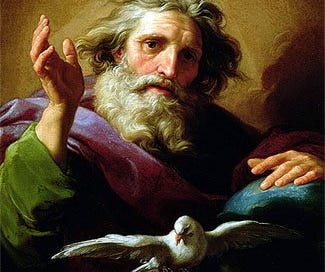The Compendium succinctly captures the very heartbeat of the Christian Gospel when it proclaims:
“God in his goodness and wisdom reveals himself. With deeds and words, he reveals himself and his plan of loving goodness which he decreed from all eternity in Christ. According to this plan, all people by the grace of the Holy Spirit are to share in the divine life as adopted ‘sons’ in the only begotten Son of God.” (Compendium, §6)
This is not mere abstract theology. This is the drama of salvation itself! Notice the deliberate order: God, in His goodness and wisdom, reveals Himself—not to dominate, not to enslave—but to share Himself. The God of Abraham, Isaac, and Jacob does not remain distant. He acts, He speaks, He reveals. He descends into history, disrupts our story, and offers us His own life. This is the fundamental reason why Christianity is not a man-made religion, but a divinely initiated revelation.
From the very beginning, man could never have known God fully through reason alone. Yes, reason can lead us to know that God exists (cf. Romans 1:20), but it could never have penetrated the mystery of His innermost life. As St. Thomas Aquinas teaches,
“It was necessary for man’s salvation that there should be a knowledge revealed by God besides philosophical science built up by human reason.” (Summa Theologiae, I, q.1, a.1)
The very act of God revealing Himself is already a demonstration of His goodness. He was under no obligation to reveal Himself, yet He did, out of sheer generosity. This is echoed in the Catechism:
“It pleased God, in his goodness and wisdom, to reveal himself and to make known the mystery of his will.” (CCC, §50)
Notice how the Compendium says, “with deeds and words.” Christianity is not just a set of ideas, but the record of divine interventions. God reveals Himself in deeds—the covenants, the deliverance of Israel, the miracles of Christ—and in words—the Law, the Prophets, the teaching of Jesus.
Dei Verbum reminds us:
“This economy of revelation is realized by deeds and words which are intrinsically bound up with each other.” (Dei Verbum, §2)
Revelation is not speculation. It is God acting and God speaking, culminating in the Incarnation:
“The Word became flesh and dwelt among us.” (John 1:14)
Before the foundation of the world, the Father had a plan of loving goodness, not merely to fix creation, but to elevate it beyond what it could ever attain by nature. God did not merely want to forgive us; He wanted to adopt us, making us partakers of His very life.
St. Paul proclaims this truth when he writes:
“He chose us in him before the foundation of the world… He destined us in love to be his sons through Jesus Christ.” (Ephesians 1:4-5)
Salvation is not God’s afterthought; it is His eternal decree. From all eternity, God planned to make us His children in the Only Begotten Son.
This is perhaps one of the most astounding truths of the Christian faith. By the grace of the Holy Spirit, we are made partakers of the divine nature (2 Peter 1:4). We are not merely restored to Eden; we are elevated to the heavenly Jerusalem.
As St. John tells us,
“See what love the Father has given us, that we should be called children of God; and so we are.” (1 John 3:1)
The goal is not simply to make us good people, but to make us partakers of God’s own life. This is not poetic metaphor. It is theological reality.
St. Irenaeus puts it with brutal simplicity:
“The Son of God became the Son of Man, so that man might become the son of God.” (Adversus Haereses, III, 10, 2)
The Compendium rightly highlights that it is “by the grace of the Holy Spirit” that we share in the divine life. It is not by our works, nor by human strength, but by the Spirit poured into our hearts (Romans 5:5). The Spirit makes us living temples (1 Corinthians 6:19) and cry out Abba, Father (Romans 8:15).
The Catholic faith is therefore not moralism. It is supernatural participation. We are not simply called to imitate God; we are called to live in union with God.
This is not just a doctrinal statement. It is a summary of the entire Christian life. God reveals Himself so that we might no longer be mere creatures, but adopted sons and daughters, partakers of the Trinitarian life itself.
This is the glory of Christianity. Not only is God knowable, but God is sharable. He reveals Himself, not to increase our information, but to give us His very life.
Let us, therefore, like St. Paul, stand in awe and cry out:
“O the depth of the riches and wisdom and knowledge of God! How unsearchable are his judgments and how inscrutable his ways!” (Romans 11:33)





